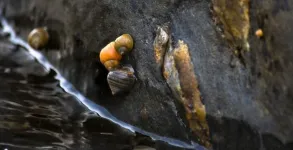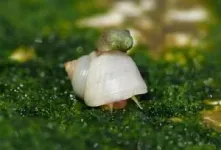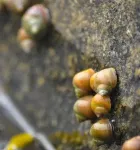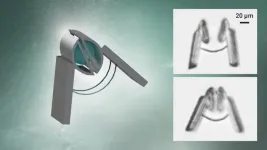(Press-News.org) **Strictly embargoed until 19:00 GMT on Thursday 4 January 2024**
Biologists uncover the secrets of evolutionary change
Images available here
Big evolutionary changes happen gradually and not in giant leaps, a team of biologists led by the University of Sheffield have discovered
Using new methodology to study an evolutionary shift in the birthing style of marine snails, experts have been able to answer the long-debated question as to how game-changing innovations like flight, vision, and the bearing of live offspring happened
Understanding the evolutionary origin of these developments is important because they can dramatically change the course of evolution, such as when live-bearing led to the diversification of mammals or feathers helped birds to evolve flight
Biologists will now be able to apply these new methods to other types of adaptation, including thermal tolerance, which must evolve if some species are to survive climate change
Significant evolutionary changes happen gradually as opposed to in dramatic ‘monster’ steps, biologists have discovered, answering the long-debated question as to how game-changing innovations like flight, vision, and the bearing of live offspring came to be.
Evolution is usually a gradual process, taking place over small, incremental steps, but occasionally producing striking new functions, like feathers that eventually allowed birds to fly.
Until now, it has been difficult to understand how these significant evolutionary changes have happened, partly because many of them took place so long ago and partly because it is hard to imagine intermediate stages. Some have suggested that they occur in big steps, when large-effect mutations give rise to ‘hopeful monsters’; others have argued that innovations are built gradually, with natural selection favouring intermediate steps.
By obtaining and studying whole-genome sequences from a group of marine snails, which have made a recent shift from egg-laying to live-birth, scientists at the University of Sheffield and their collaborators at the University of Gothenburg and Institute of Science and Technology Austria, are now able to settle the debate for at least one example.
The study used new methodology to discover whether this new shift in birthing style happened rapidly or gradually, findings which could then be applied to help explain other dramatic shifts in evolution.
Scientists were able to identify 50 genes that are perfectly associated with reproductive mode, as well as estimate the time of their origin. The results showed they accumulated gradually, spreading at different times in the past. This demonstrates that innovation can evolve progressively, rather than in a single evolutionary step.
Professor Roger Butlin, from the University of Sheffield’s School of Biosciences, said: “The evolutionary origin of key innovations is important to understand because they can dramatically change the course of evolution, like when live-bearing led to the diversification of mammals or feathers helped birds to evolve flight. Until now however, there have been few opportunities to study these, mainly because most evolutionary changes happened so long ago.
“By discovering and studying the recent evolutionary shift in the way marine snails give birth, we’re now able to understand these major changes and apply our methods to many other evolutionary shifts.”
He added: “Our results will change the way biologists view major evolutionary transitions, shifting the focus away from big leaps in evolution towards understanding the progressive benefits of small evolutionary steps. They will also help others dissect the genetic and historical basis of other adaptive traits, which is important when many organisms are being forced to adapt rapidly to a changing world.”
The team now plan to study the functions of the genes they have identified, in order to understand the series of evolutionary steps that led to live birth. They also hope that their methods will be applied to other types of adaptation, including things like thermal tolerance, which must evolve if some species are to survive climate change.
Media contact: Shemina Davis, Senior Media Relations Manager, 0114 222 5339 or shemina.davis@sheffield.ac.uk
Further information
The University of Sheffield
The University of Sheffield is a leading Russell Group university, with a world-class reputation. Over 30,000 students from 150 countries study at Sheffield. In a truly global community, they learn alongside over 1,500 of the world’s leading academics.
Sheffield’s world-shaping research feeds into its excellent education. Students learn at the leading edge of discovery from researchers who are tackling today’s biggest global challenges.
Driven by outstanding people, staff and students share a commitment to changing the world for the better, through the power and application of ideas and knowledge.
From the first documented use of penicillin as a therapy in 1930, to building Europe’s largest research-led manufacturing cluster, Sheffield’s inventive spirit and top quality research environment sets it apart.
Current research partners include Boeing, Rolls-Royce, Unilever, AstraZeneca, GlaxoSmithKline, Siemens and Airbus, as well as many government agencies and charitable foundations.
Sheffield’s Students’ Union has won the Whatuni Student Choice Award for Best Students’ Union for six consecutive years. Students can choose from 350 societies and clubs, or join over 2,000 volunteers.
Over 300,000 Sheffield alumni from 205 different countries make a significant influence across the world, with six Nobel Prize winners included amongst former staff and students.
To find out more, visit: www.sheffield.ac.uk
END
Biologists uncover the secrets of evolutionary change
2024-01-04
ELSE PRESS RELEASES FROM THIS DATE:
Does self-checkout impact grocery store loyalty?
2024-01-04
In an effort to reduce costs and improve customer satisfaction, retailers have implemented self-checkouts in stores across the country. They have become increasingly popular, but some brands like Walmart are removing self-checkouts in some locations while adding more in others. There are many advantages and disadvantages of self-checkout for both the customer and the retailer, but little formal research has investigated the impact of self-checkout on customers’ shopping experience. This led researchers from Drexel University’s LeBow College of Business to look at how self-checkout systems in grocery stores influence customer loyalty ...
Nanoparticle transport across the blood brain barrier increases with Alzheimer’s and age, study finds
2024-01-04
Neurodegenerative disorders such as Alzheimer’s disease affect more than 270 million people worldwide. AD is the leading cause of dementia, resulting in memory loss due to atrophy of neurons in the hippocampus, which is the part of the brain that regulates learning and memory. Nanoparticles designed to carry drugs have emerged as a strategy for treating different diseases, but in the context of neurodegenerative disease, much of the research has focused on developing strategies for getting nanoparticles across the blood brain barrier and into targeted regions of the brain.
In a new study, an interdisciplinary team of researchers at the University of Illinois Urbana-Champaign ...
Recent advances in medical applications of nanoparticles
2024-01-04
Nanoparticles have become an essential part of medicine, from aiding in diagnostic tests to serving as immunotherapy agents and more. Thanks to their ultrasmall size — around the thickness of a strand of DNA — these particles are adept at getting inside tissues and targeting precise areas. Here are three recent papers published in ACS journals that could expand the beneficial uses for nanoparticles, based on results in rats. The technology could be used to improve contraceptive methods, burn creams and arthritis ...
A high-tech research clinic on wheels
2024-01-04
Hispanic/Latina women with a history of hypertensive disorders of pregnancy (HDP) – conditions marked by high blood pressure during pregnancy – are more likely to have abnormalities in their heart structure and function decades later when compared with women without a history of HDP, according to a National Institutes of Health-supported study. The findings, published in the journal Hypertension, also suggest that while having high blood pressure later in life can contribute to these abnormalities, HDP play the greater role, significantly raising a woman’s risk of developing cardiovascular disease.
“The ...
Springs aboard – gently feeling the way to grasp the microcosmos
2024-01-04
These “picosprings” have remarkably large and tuneable compliancy and can be controlled remotely through magnetic fields (even deep within the human body) allowing articulated motion in microrobots as well as micromanipulations well beyond the state of the art.
Moreover, the extension of the picosprings can also be used visually to measure forces, for example propulsion or grasping forces, in interaction with other objects like cells. For example, these picosprings have been used to measure the locomotive propulsion force of sperm cells. The publication showcases these capabilities by demonstrating several ...
High folic acid and low B12 can affect fetal brain development in mice
2024-01-04
Folate is a B vitamin and a necessary nutrient to prevent neural tube defects, such as spina bifida. Folic acid, a synthetic form of folate, has been added to vitamins, breakfast cereals and other products in the U.S. and more than 80 other countries to ensure pregnant women get adequate amounts. However, new research suggests there may be such a thing as too much folic acid.
In a study published in Communications Biology, a Nature publication, researchers from the UC Davis School of Medicine and the UC Davis MIND Institute showed that imbalances in folic acid and vitamin B12 can alter brain development in mice.
“There's no doubt the introduction ...
Calibr announces license agreement with Gilead to develop a long-acting HIV antiviral agent for treatment in combination with lenacapavir
2024-01-04
LA JOLLA, CA — Calibr, the drug discovery and development division of Scripps Research, today announced Gilead Sciences, Inc. (Nasdaq: GILD) has exercised its option to exclusively license the research institute’s investigational nucleoside reverse transcriptase translocation inhibitor (NRTTI) prodrug. The NRTTI prodrug, designated GS-1614, is a development candidate resulting from a collaboration between Scripps Research and Gilead aimed at advancing a best-in-class long-acting HIV regimen.
Calibr ...
More lives can be saved if ambulance staff receive AI-support
2024-01-04
Assessing how seriously injured a person is, involves weighing up lots of different parameters fast. If healthcare professionals could get support making fast-paced, life-critical decisions from an AI tool, more lives could be saved. This is shown by research from Chalmers University of Technology in Sweden, along with the University of Gothenburg and the University of Borås.
"If severely injured people are transported directly to a university hospital, the chances of survival increase, as there are resources to take care of all types of injuries. Therefore, we need to be able to better say who is severely injured, and who is not, so ...
AURA appoints Christoph Keller as next National Solar Observatory Director
2024-01-04
The Association of Universities for Research in Astronomy (AURA) is pleased to announce that Dr. Christoph Keller has been appointed as the next Director of the National Science Foundation’s National Solar Observatory (NSO) succeeding Dr. Valentin Pillet, who will be retiring as Director in 2024. Previously Dr. Keller was Director of Science at Lowell Observatory in Flagstaff, Arizona. He will begin his five-year term on May 6, 2024.
“Christoph Keller is an outstanding choice for the next NSO Director,” ...
Pollution-tracking citizen science project offers New York students a breath of fresh air
2024-01-04
WASHINGTON, Jan. 4, 2024 – Climate change is one of the biggest issues of the 21st century, a crisis that affects the fate of the entire world as well as our place in it. A warming Earth will destroy ecosystems, flood cities, and lead to countless suffering and death for people worldwide. Part of the challenge of dealing with climate change is helping people understand its complex impacts.
In The Physics Teacher, co-published by AIP Publishing and the American Association of Physics Teachers, researchers from Fordham University partnered with middle and high schools in the Bronx and Manhattan in a citizen ...






